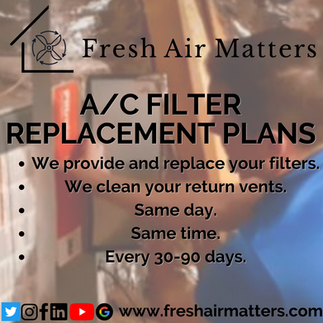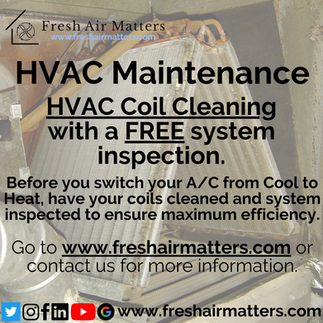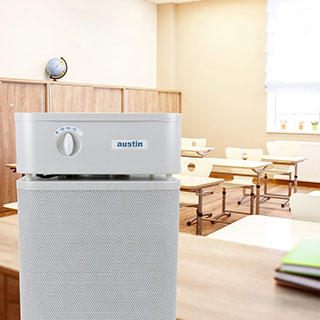What Are You Breathing?
- Fresh Air Matters
- Mar 25, 2022
- 4 min read
Indoor air quality refers to he air inside your home, buildings and structures, especially as it relates to the health and comfort of building occupants. The indoor air you breathe can be up 2-5 times more polluted than outdoor air. Understanding and controlling common pollutants indoors can help reduce your risk of indoor health concerns.

Health effects from indoor air pollutants may be experienced soon after exposure or, possibly, years later.
Your Indoor Air Quality
Some health effects may show up shortly after exposure or long-term exposures to a pollutant. These reactions include eyes, nose, and throat irritation, headaches, dizziness, and fatigue. These immediate effects are usually short-term and treatable. However, sometimes the treatment is simply eliminating the person's exposure to the source of the pollution, if it can be identified. Soon after exposure to some indoor air pollutants, symptoms of asthma may show up, be aggravated or worsened. The likelihood of immediate reactions to indoor air pollutants depends on several factors including age and preexisting medical conditions. In some cases, whether a person reacts to a pollutant depends on individual sensitivity, which varies from person to person.
It's important to pay attention to the time and place symptoms occur. If the symptoms fade or go away when a person is away from the area, for example, an effort should be made to identify indoor air sources that may be possible causes. The necessity of proper air ventilation and maximum air filtration are essential to improving indoor air quality.
Long-Term Exposure

Certain health effects may show up after long-term exposure has occurred. These effects, which include some respiratory diseases, heart disease and cancer, can be severely debilitating or fatal. It is prudent to try to improve the indoor air quality in your home, business, or school even if symptoms are not noticeable. People also react very differently to exposure to indoor air pollutants.
What Is Negatively Impacting Your Indoor Air Quality?
Indoor pollution sources that release gases or particles into the air, as well as continuous exit and re-entry into your home, business, or school are the primary cause of indoor air quality problems. The collection of dust, dirt, pollen, pet dander, and more are the most common indoor allergens. Inadequate ventilation and air filtration can increase indoor pollutant levels by not bringing in enough outdoor air to dilute emissions or filter the air within indoor sources and by not carrying indoor air pollutants out of the area. High temperature and humidity levels can also increase concentrations of some pollutants.
Pollutant sources include:

Pollen
Dust
Dirt
Mold
Pet Dander
Fuel-burning combustion appliances
Tobacco products
Building materials and furnishings as diverse as:
Deteriorated asbestos-containing insulation
Newly installed flooring, upholstery or carpet
Cabinetry or furniture made of certain pressed wood products
Products for household cleaning and maintenance, personal care, or hobbies
Central heating and cooling systems and humidification devices
Excess moisture
Outdoor sources such as:
Radon
Pesticides
Outdoor air pollution.
Factors such as how old the allergen source is and whether it is properly maintained are significant. For example, an improperly adjusted gas stove can emit more carbon monoxide than one that is properly adjusted. Some sources, such as building materials, furnishings and products like air fresheners, can continuously release pollutants. Other sources like smoking, cleaning, redecorating or doing hobbies release pollutants intermittently. Malfunctioning and poorly ventilated appliances or improperly used products can release higher and sometimes dangerous levels of pollutants indoors. Pollutant concentrations can remain in the air for long periods after some activities.
How Can Fresh Air Matters Improve Your Indoor Air Quality?

We specialize in improving your indoor air quality by creating fresh, purified indoor air. One of the most common reasons for poor indoor air quality is restricted airflow caused by the failure to regularly replace your A/C filters every 30-90 days. With a one-of-a-kind Fresh Air Matters A/C filter replacement plans, not only do we provide the filters, but we also replace them for you and clean your return vents on the same day, at the same time, every 30, 60, or 90 days. We also offer air duct cleaning which removes the indoor airborne allergens and debris such as dust, pollen, dirt, mold, bacteria, and much more from within your air duct system. Without proper removal, those allergens and debris recirculates through the air you breathe. Other service include, HVAC maintenance which includes coil cleaning and a full system inspection, carpet cleaning, whole home UV purification, and single or double bulb UV air purifier installation which inhibits microbial growth from within your air duct and your coils.
Along with our plans and services, Fresh Air Matters offers stand alone, innovative, and clinically proven, HEPA and other patented air filter air purifiers that collect and eliminate circulating indoor airborne allergens such dust, pollen, dirt, mold, odor causing allergens like pet dander, and much more. Our air quality readers allow you to know what is exactly in your air which allows you to know exactly how to clean the air you're breathing within your homes, office buildings, and schools.
Teachers and their students can spend 6-8 hours a day and around 185 days a year in a single classroom and school. Without proper ventilation and maximum air filtration, our teachers and students are breathing air 2-5 times more polluted than outdoor air. Fresh Air Matters remains dedicated to helping teachers and their students in school districts within the Dallas/Ft. Worth metroplex and around the country. Through The Fresh Air Matters Initiative we will use ALL monetary donations and ALL net proceeds from our official Fresh Air Matters tee shirt sales to donate Austin Air Systems air purifiers with a 5-year filter life to teachers. However, we need your help! Go to www.freshairmatters.com/famstore to purchase your Fresh Air Matters tee shirt or make a monetary donation of ANY amount.
For more information on how Fresh Air Matters improves and maintains maximum air filtration, air circulation, and HVAC efficiency, go to www.freshairmatters.com or contact us!
(469) 469-1852
freshairhelp@freshairmatters.com
.png)
























Comments